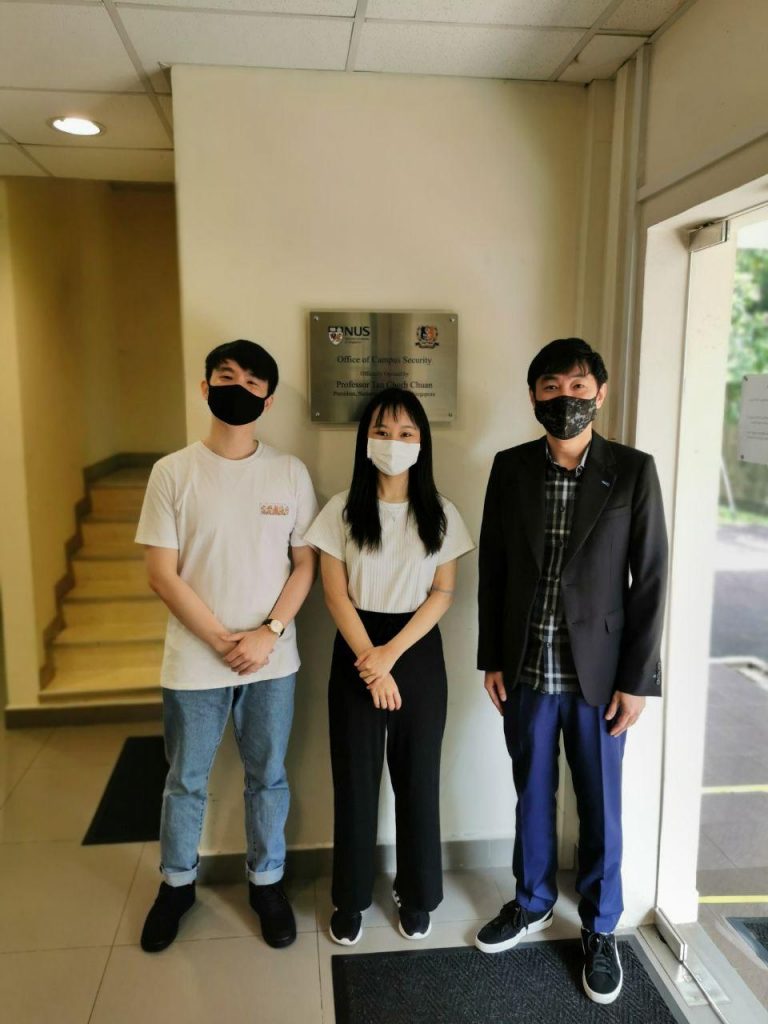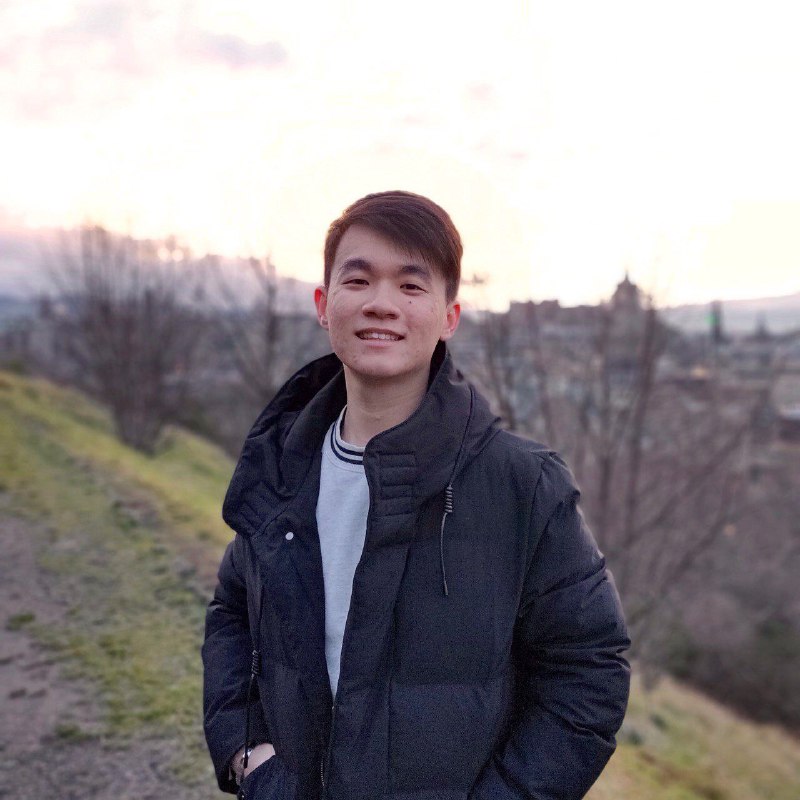CJC-F, CJC-F Activities, CJC-F Announcements
Special feature: An interview with Mr Keith It, Director of NUS Office of Campus Security (OCS)
In this article, we would like to feature NUS Office of Campus Security (OCS), their functions, and how OCS helps make the campus safe for everyone. CJC-F is particular interested in OCS’s security and investigation processes provide insights into crime prevention and incident management. We would also like to thank OCS for their unwavering support for CJC-F’s events, particularly for our annual Forensic Science Conference and the Forensic Expert Witness Advocacy Cup over the past 3 years.
On 19th January 2021, we – Alyssa Phua (Y3, DDP in Law and Business) and Ng Hao Xiang (Y3, Law) – had the pleasure to interview Mr Keith It, Director of NUS Office of Campus Security for a special feature. We believe that OCS and the work they undertake is very meaningful and provides some context to the areas CJC-F is interested in.

Group Photo with Mr It
Getting to know OCS and what it does
We began the interview with Mr It sharing with us the job scopes of each of the three divisions under OCS, and the unique challenges faced by each of the divisions.
- Operations
Put simply, the Operations division provides round-the-clock security response for the NUS community. They are generally what we can see on campus grounds (eg, personnel in uniform). The division also has a 24/7 Security Operations Centre where the video surveillance of the entire campus ground is being performed. On top of that, the Centre centralises the command and control of the ground patrol personnel.
Broadly speaking, the division attends to incidents on the ground and provide preliminary on-scene management. As such, their work often involves interacting with members of the NUS community. Mr It calls them ‘the face between security and the people on our campuses’, which includes our staff, students, as well as external vendors and suppliers that NUS engages. The challenge that comes with their work, therefore, is about projecting confidence and tailoring their security responses to the needs of the different community members.
- Investigation
As the name suggests, this division investigates into matters relating to a particular case or incident. Mr It shared with us that most of the investigators in OCS have policing background, and they can adopt principles of investigation from their experience here as well.
Mr It explained that the Investigation division tries its best to manage the expectations of parties involved in the numerous cases they attend to, particularly those of aggrieved individuals. OCS understands that every case is important, and some are especially emotionally charged. The investigators strive to empathise and build rapport with the parties involved – the victims, witnesses and sometimes even the offenders – and try to take them through the entire investigation process.
- Security Planning
This division performs what Mr It calls security assessment and security consulting for the university. Suppose a new building is coming up. The Security Planning team will go in to assess and recommend the security features and proper security measures that need to be implemented. From there, the team works together with builders and the architects for the security measures to be implemented prior to the construction.
On top of that, the division has to keep up-to-date when it comes to developments relating to technological solutions. This is so that OCS can leverage on the technological solutions to improve security operations and enhance the overall security measures NUS has.
Security tech and privacy
Hao Xiang: You said that the main challenge is to keep up with technological advancements. I noticed that on campus grounds, there are some trials involving autonomous vehicles and some kind of patrol robots. Can you share a bit more about the types of security tech that we can expect to see?
Mr It: As a whole, OCS is trying to move away from the ‘headcount-centric’ approach of security operations, to what we call a hybrid solution involving the combination of man and technology.
As for the kind of tech tools that the university can expect to see, one would be the use of video analytics. You would know that there are many cameras on campus. Reasonably speaking, one cannot expect the operator to sit and be glued to the screen for his entire shift. That is just not practical. Video analytics can help us to perform certain key duties. For example, we would first identify certain areas which are of higher concern. Then, we would apply the video analytics to send an automated alert if certain conditions are triggered. For example, they include intrusions, or when, beyond certain hours, certain things are being left behind, or that the system detects certain kinds of activities etc. These can then be automatically transmitted to the operator and the operator can then look at the camera and ascertain whether it is a false alarm or it is a case that requires attention.
Robots are something that we want to roll out, because robots are helpful in the sense that it can go round the clock for you. But the key is to first justify the need for a particular robot, and then to deploy the robots at the correct location. We cannot have a robot just for the sake of having a robot because it would not make operational sense. Right now, we are trying to work out the kind of features the robots should carry and the duties that they can perform for us. On that note, we are also trying to go beyond security needs as well. That is because the university is quite an interconnected environment. If my colleagues in another department also have a need for robot support for other purposes, we would want to see whether the different needs may actually be serviced by the same robot. If we do that, we are actually generating a higher return on investment out of this machine so to say. In that sense OCS is also moving away from being just a security-centric outfit, to one that is more communal and more encompassing in nature.
Another technology that we want to explore is the use of drone. Drones are helpful in that it has better vision. Ideally, we would like drones to be able to conduct patrol, so that my guys can actually focus their attention on something else. However, we are currently very limited by what drones can do as they are tightly regulated. For example, currently, drone pilots must maintain line of sight with their drones. So, if the drone needs to turn a corner, you have to bring it down, physically move to that bend, and then you pilot it up. This is not very efficient. So, we are working with authorities and drone providers on how we can actually overcome this. If this line-of-sight condition is removed – and of course we have to take into account the other safety considerations as well – how useful it would be to complement our security operations.
So very broadly these are the three technological solutions that we are looking at.
Alyssa: I am quite curious as to whether this drone initiative may be feasible, especially considering the restrictive regulations and issues surrounding privacy.
Mr It: The idea is to not sit on our hands and wait for things to change, and then after they have changed and say, “Okay, then let’s do the catch up”. By then it would be too late. I believe we should still go ahead with gearing our people up and prepare them to be able to operate based on the current limitation. So, with the drone example, the current limitation is that we cannot fly in an unrestricted fashion. But I can still equip my security crew with the skills to fly. That is important because at least I have a pool of certified pilots ready in the next few years. And when conditions change – and most certainly they will change – then we will have the capabilities at that time to roll out this solution.
On the part about privacy issues, it is also a work-in-progress between now and the future. So, at this point, even as we train our pilots, we can start to educate the community and assure them of how their privacy will be safeguarded, right now and in the future.
Hao Xiang: Out of curiosity, has any student or staff raised concerns about privacy to the office?
Mr It: Over the years, of course, we do have some scattered pockets of people writing in. I recall that there was somebody who was staying in a hostel. This person wrote in to say that they felt uncomfortable with cameras being installed the hostel compound. We explained the reason why we are doing this, and more importantly the kind of safeguards in place that privacy is really being maintained. We also have our SOP in place to guide our security personnel on the use of CCTV.
Impact of COVID-19
We are all acutely aware of how much COVID-19 has disrupted our way of life. But we were still interested to hear from Mr It about how it has affected OCS’s work.
Unsurprisingly, frontline duties are considered critical functions and are less affected by alternative work arrangements. As such, it has been business-as-usual for personnel on the ground.
As for investigators, Mr It shared that they mostly worked from home under the appropriate safe management measures. If a case occurs, they will first evaluate the nature of the case. By and large, the investigators will be back to attend to the cases in campus. On the other hand, if the investigators can communicate with interviewees online or through email, then they will also do so.
Security planners too work from home where possible, unless something requires their attention on the ground.
Challenges in a university environment
When asked about whether performing security functions in a university environment poses unique challenges, Mr It identified two: (1) NUS has a large and mostly transient community, and (2) NUS campuses are porous.
- Large and transient community
Mr It shared that NUS has about 50,000 staff and students. He commented on how this is akin to the size of a town. Not only that, students come and go as they move through their academic career. That means that OCS will work with a brand-new community every year, which makes their community engagement a constant work-in-progress.
He added that the community is not a homogenous one, and that a key challenge when rolling out security measures is to communicate to the different stakeholders and get their ‘buy-in’. When it comes to engaging students, OCS works chiefly with NUS NPCC as well as the hall masters for outreach and to get student input. For staff, OCS typically engages the faculties and the department heads directly.
Perceptively, Mr It told us that the size of the NUS community is something that can be both a challenge and a strength. While reaching out to the 50,000 is a challenge, the nature of OCS’s work becomes so much easier if there is a community ‘buy-in’ of this size.
- Porous campuses
Another unique challenge OCS faces is that the campus grounds are very open. Our campus grounds are accessible by a variety of public transport means. In addition, not all buildings in NUS have access control. This is perhaps something that most security outfits in private organisations would not face because access control can be more easily managed there.
OCS manages this challenge through a combination of hard and soft measures. Examples of hard measures would include access control, security equipment (including even lighting, bollards, etc.). On the other hand, soft measures would refer to outreach programmes, patrols, etc. Mr It explained that this combination of hard and soft measures is how OCS ensures that the whole security mechanism in NUS works.
Getting to know Mr It
Before his appointment as the Director of OCS, Mr It served in the Singapore Police Force and had a stint as the Head of Special Investigations under Singapore Customs.
Alyssa: Earlier you mentioned that a lot of investigation officers have policing or related background. And I understand that Mr It yourself you also have that background. So, what made you interested in this area of security and how did your policing work back then help you in your work today?
Mr It: For this we have to go through a bit of history. When I graduated, it was not exactly the best of times. At that time, there was the Asian Financial Crisis. So, jobs in the private sector were difficult to come by. Luckily the government was recruiting at that time. I looked at openings that the civil service listed. I found that policing is something that was close to my heart. I was thinking of being able to reduce crime and help victims of crime. And so, it’s on that premise that I signed up to the police force.
I was primarily involved in investigation in the police force. I first did general investigations, then I did investigations in specialised crimes – unlicensed money lending, vice activities, etc. And then I had a stint under operations: to come up with policies and procedures to aid the units that perform investigation. My final stop before I left the service was with the serious sexual crime branch. That was about investigating cases of sexual cases triable in the High Court.
As for why I want to move to corporate work, I suppose it’s also because I want a longer runway in terms of professional development. I thought that after about 12 to 13 years in the police force, that’s just about right time for me to move on.
Alyssa: So, would you say that your experiences back when you were in the police force actually helped you in your work in OCS?
Mr It: Yes, I will say so. Policing covers many aspects of work: law enforcement, planning, communicating with stakeholders, investigation, etc. Actually, investigation on its own is very niche and specialized. When I came on board here, the experiences in terms of planning and conceptualization helps with general management skills that are required. The investigation knowledge is also very helpful when I am supervising investigations now.
Alyssa: Do you have any memorable cases that you dealt with – be it in the police force or as director of NUS OCS – that you can share with us?
Mr It: I prefer not to discuss the cases in NUS. Though I will not discuss the cases, I will say that every case is different.
While the offence classification may be the same across certain cases, the management of the cases vary significantly. The psyche, the profiles and the mental wellness aspects in particular are unique to each case. So, each case is really managed according to its own characteristics and circumstances.
For policing, there are definitely more ‘colourful’ cases. During my time with the specialised crime unit, I got the opportunity not just to investigate cases involving gangs and unlicensed moneylending syndicates, but also to support my superiors in coming up with policies to deal with this type of cases. So, for the policy work it gave a different angle and perspective to my work.
For operations management, again, it’s a different ballgame. It is about coming up with SPF-wide policies to aid the investigation units. What you pen down affects the downstream processes very much. So again, it puts a perspective on how investigation is like.
In my final posting with the serious sexual crime unit, due to the nature of the cases, the way we handle the cases, the victims and the offenders are quite different from other types of crime. The reading of the cases, the assessment and handling of evidence becomes very important in securing convictions of offenders.
Concluding thoughts
Hao Xiang: On the point that OCS’s work in the community is always a work in progress, are there any common misconceptions that students and/or staff have about what the OCS does and does not do?
Mr It: I am sure there are a few. Here’s one. I think some students are under the impression that, because we provide security on a 24/7 basis, they ought to be able to see security personnel patrolling at all times. The misconception is that they equate ‘security presence’ and ‘security coverage’ with seeing security personnel on the ground always. However, ‘security presence’ is really a combination of different measures – CCTV camera surveillance, security personnel on patrol, etc. Another consideration is that having very large pool of security personnel on the ground is quite costly as a way to project security presence. So, without compromising on the security presence that we project, we are now trying to leverage on the technology that I shared earlier – the use of data analytics and robots, etc. – to assist us. But having said that, when an incident occurs, our security response will be present.
Hao Xiang: A final question to round things up, and this is perhaps an opportunity to reach out to the student community: Is there anything that you would want to say or appeal to the students?
Mr It: At the end of the day, security is a shared responsibility. While OCS will put in place the people, the technology, and the policies and processes to secure the campus, we will be able to achieve so much more if the community stays vigilant and help us with making the campus safe. This is especially because the campus is so large, which makes it difficult to closely monitor every nook and cranny. If, like through the Threat-Oriented Person Screening Integrated System (TOPSIS) programme, the community can be our eyes and ears, it will really help our work. We all belong to this NUS community and I hope that everyone can do our part!
—
We would like to thank OCS and Mr Keith It for accepting our interview request. We had an enjoyable session and learnt a lot of about the critical role OCS plays in the NUS community. We hope that the insights gleaned from this interview was as fruitful as we found them to be! NUS is a community that we all belong in and we can all contribute to make it a safer place for everybody.
*The views and opinions expressed in this article do not constitute legal advice and solely belong to the author and do not reflect the opinions and beliefs of the NUS Criminal Justice Club or its affiliates.
 Ng Hao Xiang is currently in his third year at NUS Faculty of Law. As deputy director of CJC-F, he manages CJC-F’s internal events and assists the director in overseeing the club’s major projects. Outside of his interest in forensics and law, he enjoys dance and is currently a member in NUS D’Hoppers Dance Crew.
Ng Hao Xiang is currently in his third year at NUS Faculty of Law. As deputy director of CJC-F, he manages CJC-F’s internal events and assists the director in overseeing the club’s major projects. Outside of his interest in forensics and law, he enjoys dance and is currently a member in NUS D’Hoppers Dance Crew.
 Alyssa Phua is currently in her third year under the NUS DDP in Law and Business. As the director of CJC-F, she is in-charge of directing, coordinating and overseeing all activities, events and projects in CJC-F.
Alyssa Phua is currently in her third year under the NUS DDP in Law and Business. As the director of CJC-F, she is in-charge of directing, coordinating and overseeing all activities, events and projects in CJC-F.









